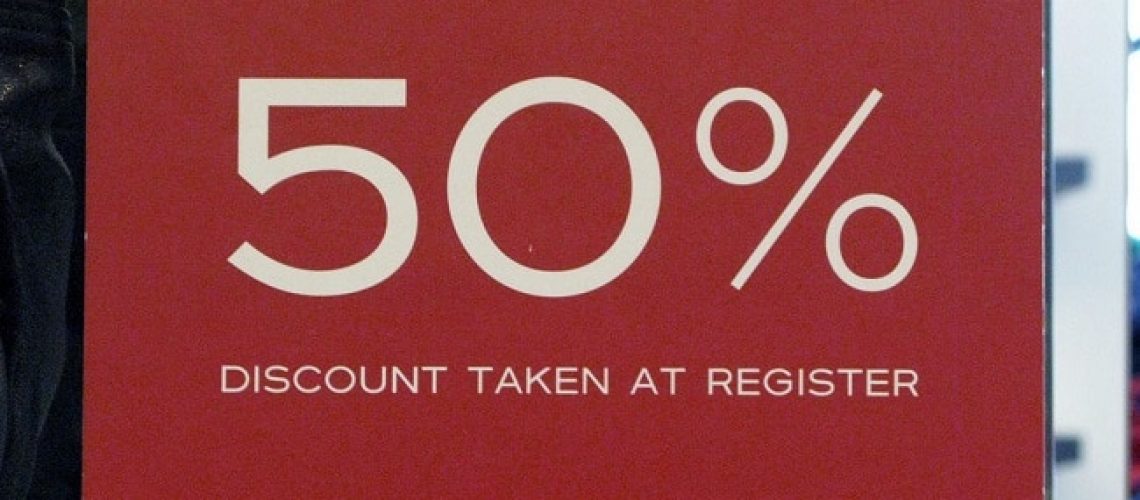“Why aren’t you taking advantage of the massive sales at the moment? You of all people should know you can save a ton of money right now!”
An acquaintance couldn’t believe that I was avoiding all of the significant discounts being offered by stores in my area. It’s sale time, what was I thinking? Didn’t I want to save money?
This morning, I read an article in my local paper stating that Canadians’ debt levels are at an all-time high. What’s worse, they’re showing no sign of slowing down.
There’s no shortage of articles on how we spend too much and save too little. It’s an ongoing challenge.
I would add that part of the problem seems to be that we have a skewed concept of saving money.
What’s really going on?
To illustrate, here’s a question:
Do you save money when you buy an item at a discounted price?
You might think you’re saving money by spending less for a purchase, but there’s no actual saving going on unless you take a couple more steps to park the “saved” funds in a place where they won’t get sucked right back out of your wallet.
The act of saving money involves setting it aside for your emergency fund, a planned fund for future expenditures (such as a trip), or growth through investments. In these cases, the money gets deliberately pulled from your chequing account and saved for a specific purpose.
When you buy something on sale, you certainly pay less than the usual price. But, first and foremost, you are spending money.
Money has gone out of your pocket and will not benefit you in the future in the form of investments or planned spending.
Second, you have technically not saved a dime unless you have taken the difference between the retail price and what you paid, and placed that money in a savings or investment account.
If you’ve done the latter, stop reading; this post doesn’t apply to you. For everyone else, I’d like to challenge you to rethink your assumptions about savings.
Saving money is a deliberate action that results in the growth of your net worth. You’re using money for the purpose of improving your financial situation, protecting yourself, or investing in future benefits.
Spending money includes every other action undertaken with money. If you bought something, you may be super happy about the spend, but it nonetheless represents a reduction in your net worth. After the purchase, you have less money in your new, designer jeans.
Note that I’m not talking about spending money on insurance or other documents that exist to offer protection. I’m referring to the temptation to indulge in sales while deluding yourself that you’re saving money.
The annoying details
You might say, “Doris, why are you so picky about the language we use? You know what we mean when we say we’re saving money.”
As someone who trained to be a Neurolinguist, I have a deep-seated respect for the power of using clear language.
What we say matters. How we say it matters, as well. The way we frame issues affects our perception of those issues.
It’s time that we stop tricking ourselves into thinking that we’re doing something financially noble when we buy items at reduced prices.
I love a great sale as much as anyone and it’s cool when you find something you need at a fraction of the price you thought you’d have to pay. Terrific!
Just don’t call the difference in price “saved money”, because I bet it will get spent on something else in a heartbeat.
Call it “delayed spending”, if anything.
Your mission, should you choose to accept it
Here’s my challenge to you:
The next time you buy something on sale, transfer the difference in price from your checking to your savings account.
Then, invest at least half of what you have genuinely saved, with the other half going to your emergency fund, if it’s not full (and odds are it isn’t, based on this article), or your designated savings account.
Now you can say that you’ve saved money – give yourself a high five. You’ll consider yourself a financial rock star ten years from now when you start reaping the rewards.
And really, who doesn’t want to be a rock/pop/(pleaseGodnot)country star?
Want a proven process to help you make savvy financial decisions that are in your highest, best interests every time?
Grab your copy of my FREE Cheat Sheet.
In it, you’ll discover the four key questions to ask yourself, in order, to gain total clarity on the right financial decisions for you.
This process works for all decisions, big and small.
Make indecision, second-guessing, and analysis-paralysis a thing of the past.


